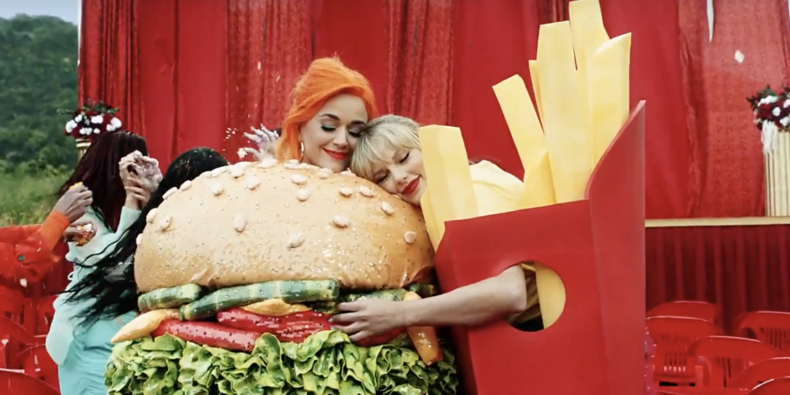Taylor Swift’s new single “You Need To Calm Down” is a moment of transformation. As an artist that, until recently, has remained resolutely silent on political matters, Swift’s new single is an explicit, unambiguous statement of support for the LGBTQ+ community. Such a move is important, particularly given that her silence has previously been interpreted as a sign of support for far-right agendas. Moreover, given her country roots, one could argue that Swift has a particularly broad fanbase, one that might benefit from a political and cultural reckoning. Swift has also cemented her politics with more than just rhetoric: she has donated to LGBTQ+ organizations, performed in support of the cause, and even started a new petition in support of the Equality Act.
All of these are laudable moves; they signal a genuine allegiance that goes beyond the gauzy, technicolor aesthetics of her new album. While Swift may be hitting the right notes in terms of advocacy, her efforts in songwriting—the field that she knows best—comes across a little tone-deaf. “You Need To Calm Down” stands uneasily between her formerly apolitical, self-focused artistry and her new, advocacy-driven assertiveness. The single is the auditory equivalent of a political pamphlet; it sounds like a patchwork of stitched-together Twitter pronouncements. The music video, while unambiguous in its pro-LGBTQ+ messaging, unreflectingly trots out what seems to be the deluxe package of queer tropes: garishly vibrant palettes, drag queens, and the entire lineup of queer personalities in showbiz.
In her airy, devil-may-care positivity, Swift conflates anti-LGBTQ+ discrimination and hate speech with the online gossip and negativity of a public figure. Entangled within the tableaux of queer positivity are references to Swift’s feud with the Katy Perry and the assumed enmity with other pop stars. The closing shot of the video—reconciliation and affection between Swift and Perry—suggests that Swift’s new politicization retains, at its center, a fixation with her own celebrity.
“You Need To Calm Down” works as an anti-toxicity, down-with-the-haters summer anthem. It is a song that you can bop, and ultimately sing along to, whether you actually enjoy it or not, like much of Swift’s other pop hits. It also wouldn’t be the first Swift single that belies the depth of the rest of her album. However, in skating by on the surface glaze of targeting negativity and toxicity, Swift’s song can rightly be criticized for focusing only on the superficial, the gestural.
You could say that artifice is just the nature of pop, but Swift’s pointed campaign in the leadup to “You Need to Calm Down” often teethers into the territory of queer-baiting. With the speculations surrounding Swift’s own sexuality (particularly the rumor that Swift was once romantically involved with the supermodel Karlie Kloss), her pointed campaign of genderbent lyrics, bisexual hair, and Pride-month releases appear curiously opportunistic.
Swift self-identifies as an ally; she professes to understand the difference between advocating and baiting. The problem, however, is that—speculations about her sexuality notwithstanding—references to the elements of Swift’s public persona take center stage over her Pride messaging. Her one-size-fits-all approach to shrugging off the haters is discomfiting: by equating her struggles with those of queer people, Swift runs the risk of placing herself in the center of attention while she claims to be a supporter.
Swift has always shown a penchant for narrative, and her lyrics often hint at aspects of her personal life. In recent years, however, her self-narrativizing has shifted from paparazzi photos and slyly allusive interviews to public feuds and barely-veiled references. While Reputation (2017) was not ultimately about revenge or settling scores, much of its branding centered around Swift’s feud with Kanye West. We expect art to derive from aspects of personal life, but Swift transfigures these episodes into plot points, incorporating them into a story for the popular imagination. Her successive reinventions are transfixing when they concern a shift in genre, perspectives on love, or her public image. Yet Swift seems to struggle to find her footing as an ally. The message of support seems to be cheapened by the closing scene of reconciliation between Swift and Perry—a move that seems particularly staged given that Swift and Perry had already made up last year. Moreover, her rainbow aesthetic and new politicization are uncomfortably tied to the periodic rebranding associated with her album cycle. While it is praiseworthy that Swift is using her tremendous cultural and economic power to celebrate and support LGBTQ+ communities, it is also important not to overlook the hiccups in delivery. As it stands, “You Need To Calm Down” is a strange admixture of self-regarding narrative and of genuine attempts at LGBTQ+ support.
Despite the online mulling and publicity-driven sleights of hand, Taylor Swift is hardly a figure that can be thoroughly transformed every two years in her album-writing cycle. Nor can there be a definitive pronouncement on her goodness or badness by stacking up every positive and problematic thing she has done. The staying power of Swift’s work has always been in the emotional honesty and complexity of her lyrics, not just her extraordinary skill at marketing. However, in straining to hit all the right notes, from that of pitch-perfect ally to positivity-drenched butterfly, Swift trips on the trains of her various dresses, more punchline than persona.

